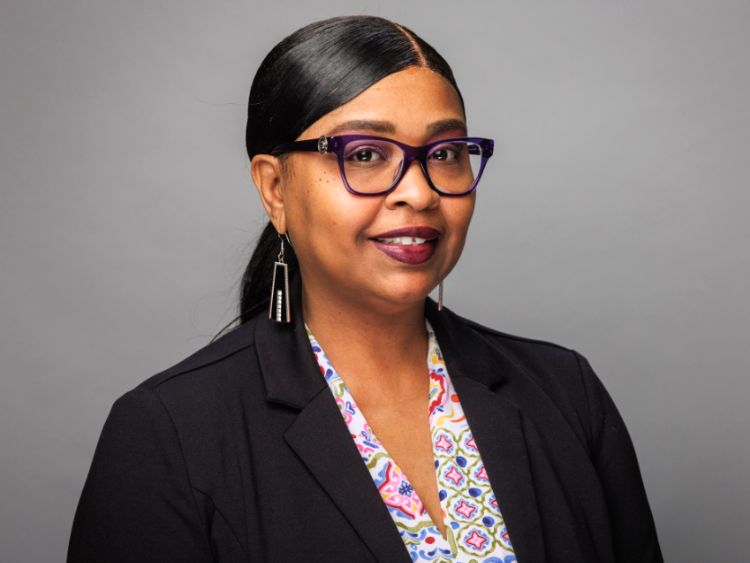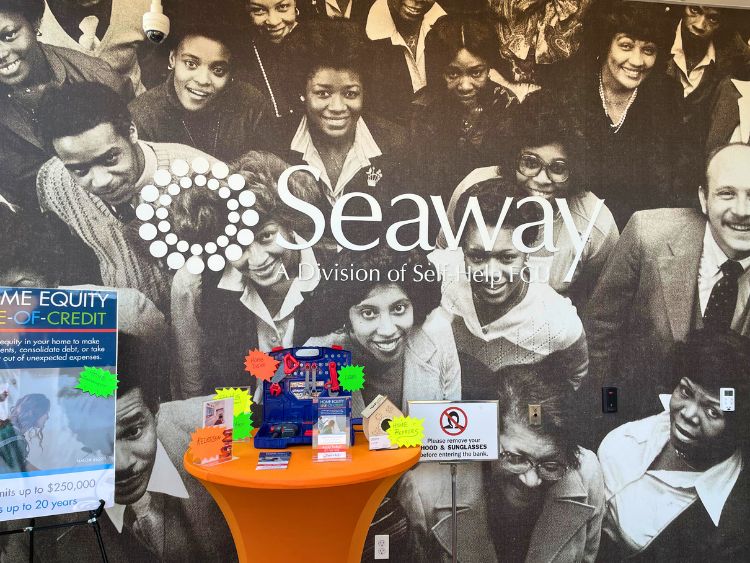April Snow of Self-Help Federal Credit Union honors the legacy of historic Seaway Bank while teaching the South Side community how to build wealth, one account at a time (Photo Credit: Marshelle Sanders).
“This is a legacy of inspiration. And we’re just getting started,” said Chatham Branch Manager April Snow of the Historic Seaway Bank, which was opened in 1965 and closed in 2017 and is now operating as Self-Help Federal Credit Union located on the south side of Chicago at 645 E. 87th St.
Self Help Federal Credit Union has multiple locations in Chicago and surrounding suburbs, but what makes this location special is its history, which lies beyond its doors.
“At Seaway, a Self-Help Federal Credit Union division, we believe financial equality begins with knowledge — and it starts with the basics: a checking and savings account,” stated Snow.
As part of Money Smart Week, April and I want to help underserved communities and people understand these foundational tools’ true power. Having a secure place to manage your money isn’t just about convenience — it’s about building stability, creating opportunity and laying the groundwork for generational wealth.

Marshelle Sanders: Hi, April! Thank you so much for allowing me to interview you about saving money and making smart money moves. To start, why is having a checking and savings account essential?
April Snow: It’s all about discipline and balance. A savings account teaches you to put money away and leave it alone. Back then, savings were always the first account you opened — it helped you build that “set it and forget it” mindset. If everything’s in your checking, you’re more likely to spend it.
Sanders: What are some common misconceptions people have about credit unions or banks, especially in underserved communities?
Snow: One big misconception is that banking or credit institutions don’t offer ways for people to monitor their accounts. At Self-Help, we offer all the tools necessary to keep track of all accounts—online banking, alerts, and statements. People sometimes let others access their accounts —a partner, a family member, etc.— and then get surprised when money’s missing.
Monitoring your account is an important responsibility. If something looks off, bring it to us or your establishment early. We’ll go to bat for you.
Sanders: How does saving money help build long-term wealth in Black communities?
Snow: Saving is your power. For many people, a savings account has been their insurance rather than getting specific policies. We’ve had members pass away and leave behind meaningful savings. Their family could be noted, instructed by the deceased to pay for everything through their savings.
Whether it’s home repairs, emergencies, or generational support, savings are how you start.
Sanders: What programs or workshops does Self-Help offer to the community?
Snow: We’re open to everything. We’ve hosted financial workshops and credit-building sessions, and we’re open to hosting more informative and community-building events in our building for the community for free. Reach out to us. We have space at the branch for members and nonprofit businesses to use.
We also offer financial tools like our Fresh Start Loan, which helps members build credit and save simultaneously. It’s a small loan held in a savings account, and you make payments over time. When it’s paid off, the funds are released to you, and we’ve reported a positive payment history to the credit bureaus.
Sanders: Is Self-Help tech-friendly? What if someone isn’t comfortable with apps or smartphones?
Snow: We are very tech friendly. We encourage everyone to download our or their institution’s app when they open an account. It gives you 24/7 access to your balance, transactions and tools.
For our older members, we take the time to help. Some of them upgraded from flip phones to using the app! We’ll walk them through how to close screens, navigate apps and use Face ID. If they’re not ready, we make a note.
I just want people to know that you belong in financial spaces. Even if you didn’t grow up with financial literacy, you can start now. Teach your kids, ask questions and learn together. Self-Help is here to serve. We’ve walked this path with so many members, and we’ll walk it with you, too.
A Legacy Beyond Banking: Seaway’s Heart Still Beats in Chatham
“When you walk into the building, the first thing you see is the mural,” says April, a 28-year veteran of Seaway. “Those faces are the old Seaway Bank team members.”
Founded in 1965, Seaway was more than a bank—a symbol of Black excellence and economic empowerment. Millionaires banked there because they believed in building with people who looked like them.
The Legacy Wall

The Legacy Wall stands in the renovated lower level of the building, where meetings and storage occur—a powerful tribute to Seaway National Bank’s history, impact and community roots. Once recognized as the largest African-American-owned bank in the country, Seaway’s legacy is preserved through the stories and artifacts displayed throughout the space.
At the center of the wall is cofounder Ernest T. Collins, who served as chairman from 1975 until his passing in 1987.
Photographs highlight key individuals in Seaway’s history, including Mr. Jacoby Dickens, whose name now adorns a building at Chicago State University, and the original Land Trust team, who played a pivotal role in the bank’s financial initiatives. A notable image features Muhammad Ali alongside his best friend, Mr. Cleve Walker.
The wall also honors the legacy of Union Bank, which was later acquired by Seaway and is long remembered by staff and community members. One of Dr. Martin Luther King Jr.’s affiliated organizations once held an account there, underscoring the institution’s deep roots in civil rights and Black economic empowerment.
Also featured is Mr. Walter Grady, Seaway’s president for over 35 years and the country’s longest-serving Black financial institution president. In one photo, civil rights leader Rev. Jesse Jackson stands proudly beside him.
Today, the space is managed by April Snow, a longtime employee who began as a teller in 1997. Now working with Self-Help Federal Credit Union, she continues the legacy Seaway built. “Even as a nonprofit, our mission remains focused on helping people build sustainable financial futures,” she shared.
The lower level now serves as a multipurpose space for real estate meetings, contractor briefings and community gatherings, all hosted with the same community-first spirit that defined Seaway.
To learn more, begin your financial journey, visit Seaway at Self-Help Federal Credit Union (Chatham branch) at this link or email April Snow at asnow@self-helpfcu.org.
